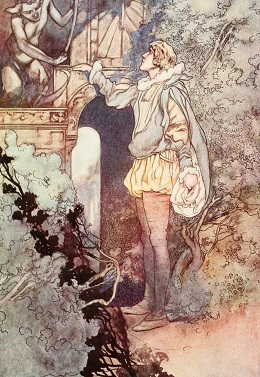| SONNET 55 |
PARAPHRASE |
| Not marble, nor the gilded monuments |
Not marble, nor the gold-plated shrines |
| Of princes, shall outlive this powerful rhyme; |
Of princes shall outlive the power of poetry; |
| But you shall shine more bright in these contents |
You shall shine more bright in these verses |
| Than unswept stone besmear'd with sluttish time. |
Than on dust-covered gravestones, ravaged by time. |
| When wasteful war shall statues overturn, |
When devastating war shall overturn statues, |
| And broils root out the work of masonry, |
And conflicts destroy the mason's handiwork, |
| Nor Mars his sword nor war's quick fire shall burn |
the cause of war (Mars) nor the effects of war (fire) shall destroy |
| The living record of your memory. |
The living record of your memory (this poem). |
| 'Gainst death and all-oblivious enmity |
Against death and destruction, which render people forgotten, |
| Shall you pace forth; your praise shall still find room |
Shall you push onward; praise of you will always find a place, |
| Even in the eyes of all posterity |
Even in the eyes of future generations |
| That wear this world out to the ending doom. |
That survive until the end of humanity. |
| So, till the judgment that yourself arise, |
So, until you arise on Judgment Day, |
| You live in this, and dwell in lovers' eyes. |
You are immortalized in this poetry, and continue to live in lovers' eyes. |
Notes
Not marble, nor the gilded monuments (1): This line is likely an allusion to the lavish tombs of English royalty; in particular, to the tomb of Henry VII in Westminster Abbey, which contains a large sarcophagus made of black marble with gilded effigies of King Henry and his queen, Elizabeth of York.
unswept (4): note that the pronunciation here is /UN swept/.
with sluttish time (4): i.e., by filthy time.
In Elizabethan England the word "sluttish" could describe either a sexually promiscuous woman or a grubby, unkempt woman. Here Shakespeare personifies Time as the latter.
broils (7): angry, violent quarrels or riots.
all-oblivious enmity (9): i.e., the war and decay that would render the subject of the poem forgotten.
Sonnet 55 is one of Shakespeare's most famous works and a noticeable deviation from other sonnets in which he appears insecure about his relationships and his own self-worth. Here we find an impassioned burst of confidence as the poet claims to have the power to keep his friend's memory alive evermore.
Some critics argue that Shakespeare's sudden swell of pride in his poetry was strictly artificial - a blatant attempt to mimic the style of the classical poets. "It is difficult on any other hypothesis to reconcile the inflated egotism of such a one as 55 with the unassuming dedications to the Venus and Lucrece, 1593 and 1594, or with the expressions of humility found in the sonnets themselves, e.g. 32 and 38" (Halliwell-Phillipps, 304).
However, many believe that such an analysis ignores Shakespeare's paramount desire to immortalize his friend in verse, and not himself (as was the motive of most classical poets). "The Romans say: Because of my poem I will never die. Shakespeare says: Because of my poem you will never die....What distinguishes Shakespeare is that he values the identity of the beloved; he recognizes that the beloved has his own personal immortality, in no way dependent on poetry" (Martin, 158).
By focusing on the word live, Shakespeare uses the language itself to emphasize his authorial intentions. Notice the word choices of outlive (2), living (8), oblivious (9), and live (14).
Despite its tremendous popularity, Sonnet 55 has its detractors. One of the most interesting attacks on the sonnet came from a critic named H. T. S. Forrest, who despised the poem and, in particular, lines 10-14. These lines, he wrote, are
slovenly, far-fetched, and tautologous verses which would be mercilessly criticized if they appeared as the handiwork of the minutest of the minor poets of today. Why "even"? To talk of printed matter "finding room" in people's eyes is not a little ridiculous. In line 11 the poet's verses are going to be looked upon by the whole of posterity, but in line 14 only by the 'lovers' section thereof. And line 13 is hopelessly ungrammatical, even if we accept Beeching's explanation that that = when (Forrest, 44).
How to cite this article:
Shakespeare, William. Sonnet 55. Ed. Amanda Mabillard. Shakespeare Online. 8 Dec. 2008. < http://www.shakespeare-online.com/sonnets/55detail.html >.
References
Forrest, H. T. S. The Five Authors of Shakespeare's Sonnets. London: Chapman & Dodd, Ltd., 1923.
Halliwell-Phillipps, J.O. Outlines of the Life of Shakespeare. New York, AMS Press, 1966.
Martin, Philip J. T. Shakespeare's Sonnets: Self, Love and Art. Cambridge: Cambridge UP, 1972.
______
Even More...
 Shakespeare in Old English? Shakespeare in Old English?
 Shakespeare's Influence on Other Writers Shakespeare's Influence on Other Writers
 An Elizabethan Christmas An Elizabethan Christmas
 Clothing in Elizabethan England Clothing in Elizabethan England
 Queen Elizabeth: Shakespeare's Patron Queen Elizabeth: Shakespeare's Patron
 King James I of England: Shakespeare's Patron King James I of England: Shakespeare's Patron
 The Earl of Southampton: Shakespeare's Patron The Earl of Southampton: Shakespeare's Patron
 Going to a Play in Elizabethan London Going to a Play in Elizabethan London
 Ben Jonson and the Decline of the Drama Ben Jonson and the Decline of the Drama
 Publishing in Elizabethan England Publishing in Elizabethan England
 Shakespeare's Audience Shakespeare's Audience
 Religion in Shakespeare's England Religion in Shakespeare's England
 Alchemy and Astrology in Shakespeare's Day Alchemy and Astrology in Shakespeare's Day
 Entertainment in Elizabethan England Entertainment in Elizabethan England
 London's First Public Playhouse London's First Public Playhouse
 Shakespeare Hits the Big Time Shakespeare Hits the Big Time
|

More to Explore
 Introduction to
Shakespeare's Sonnets Introduction to
Shakespeare's Sonnets
 Shakespearean Sonnet
Style Shakespearean Sonnet
Style
 How to Analyze a Shakespearean Sonnet How to Analyze a Shakespearean Sonnet
 The Rules of Shakespearean Sonnets The Rules of Shakespearean Sonnets
 Shakespeare's Sonnets: Q & A Shakespeare's Sonnets: Q & A
 Are Shakespeare's Sonnets Autobiographical? Are Shakespeare's Sonnets Autobiographical?
 Petrarch's Influence on Shakespeare Petrarch's Influence on Shakespeare
 Themes in Shakespeare's Sonnets Themes in Shakespeare's Sonnets
 Shakespeare's Greatest Love Poem Shakespeare's Greatest Love Poem
 Shakespeare and the Earl of Southampton Shakespeare and the Earl of Southampton
 The Order of the Sonnets The Order of the Sonnets
 The Date of the Sonnets The Date of the Sonnets
 Who was Mr. W. H.? Who was Mr. W. H.?
 Are all the Sonnets addressed to two Persons? Are all the Sonnets addressed to two Persons?
 Who was The Rival Poet? Who was The Rival Poet?
_____
Did You Know? ...  "Of the countless editions of the works of Shakespeare that show a frontispiece likeness of the poet, it is a singular fact that by far the greater number favour the 'Chandos' portrait. The face and features of Shakespeare as 'imaged' in that portrait are those with which his readers are probably most familiar. It is not easy to account for this, since the Chandos Portrait is certainly not the first in point of genuineness, whatever may be its degree of artistic merit. Possibly it satisfies more fully the popular ideal of the likeness of a great creative poet than does the bust or print just referred to. Be that as it may, the 'Chandos ' portrait, for various reasons, more than justifies its being kept in the custody of the nation as a very rare and valuable relic of its greatest dramatist." Alexander Cargill. Read on.... "Of the countless editions of the works of Shakespeare that show a frontispiece likeness of the poet, it is a singular fact that by far the greater number favour the 'Chandos' portrait. The face and features of Shakespeare as 'imaged' in that portrait are those with which his readers are probably most familiar. It is not easy to account for this, since the Chandos Portrait is certainly not the first in point of genuineness, whatever may be its degree of artistic merit. Possibly it satisfies more fully the popular ideal of the likeness of a great creative poet than does the bust or print just referred to. Be that as it may, the 'Chandos ' portrait, for various reasons, more than justifies its being kept in the custody of the nation as a very rare and valuable relic of its greatest dramatist." Alexander Cargill. Read on....
|
_____
 Shakespeare on Jealousy Shakespeare on Jealousy
 Shakespeare on Lawyers Shakespeare on Lawyers
 Shakespeare on Lust Shakespeare on Lust
 Shakespeare on Marriage Shakespeare on Marriage
 Blank Verse and Diction in Shakespeare's Hamlet Blank Verse and Diction in Shakespeare's Hamlet
 Analysis of the Characters in Hamlet Analysis of the Characters in Hamlet
 Shakespeare on the Seasons Shakespeare on the Seasons
 Shakespeare on Sleep Shakespeare on Sleep
|

 "Of the countless editions of the works of Shakespeare that show a frontispiece likeness of the poet, it is a singular fact that by far the greater number favour the 'Chandos' portrait. The face and features of Shakespeare as 'imaged' in that portrait are those with which his readers are probably most familiar. It is not easy to account for this, since the Chandos Portrait is certainly not the first in point of genuineness, whatever may be its degree of artistic merit. Possibly it satisfies more fully the popular ideal of the likeness of a great creative poet than does the bust or print just referred to. Be that as it may, the 'Chandos ' portrait, for various reasons, more than justifies its being kept in the custody of the nation as a very rare and valuable relic of its greatest dramatist." Alexander Cargill.
"Of the countless editions of the works of Shakespeare that show a frontispiece likeness of the poet, it is a singular fact that by far the greater number favour the 'Chandos' portrait. The face and features of Shakespeare as 'imaged' in that portrait are those with which his readers are probably most familiar. It is not easy to account for this, since the Chandos Portrait is certainly not the first in point of genuineness, whatever may be its degree of artistic merit. Possibly it satisfies more fully the popular ideal of the likeness of a great creative poet than does the bust or print just referred to. Be that as it may, the 'Chandos ' portrait, for various reasons, more than justifies its being kept in the custody of the nation as a very rare and valuable relic of its greatest dramatist." Alexander Cargill.